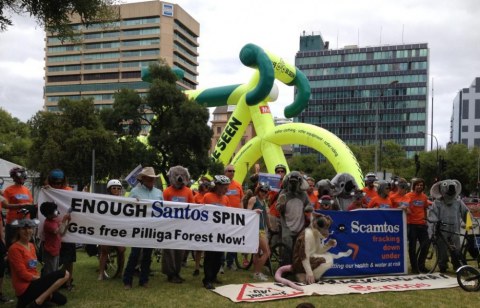The Santos sponsored Tour Down Under was visited today by anti-CSG activists from the Pilliga Forest near Gunnedah in New South Wales. The protesters on bicycles took their protest to Santos Head Office in Adelaide today. Santos is the major sponsor of the Tour Down Under, so activists such as @thepilligamouse and several koalas hoped on their bikes to ride around Adelaide this morning to protest Santos’s destructive and toxic coal seam gas operations in Eastern Australia’s largest remaining temperate woodland and surrounding farmlands. They were joined by NSW politician and grazier David Quince.
Related: Total Fire Ban exemption for Santos CSG plant riles Pilliga residents
The activists say Santos’ toxic coal seam gas operations threaten Eastern Australia’s largest temperate woodland, including threatened species like the Pilliga Mouse. While Tour Down Under cyclists get clean water, NSW farmers want the same.
“As far as we’re concerned, the real cycle that Santos is bringing to our region is a cycle of destruction from coal seam gas that will alienate some of our best farmland, risk our groundwater supplies and cause land values to plummet,” said David Quince, a NSW grazier and Gunnedah Shire Councillor.
“I have traveled to Adelaide to highlight how this project threatens the Liverpool plains, an iconic and important NSW food bowl.
The Wilderness Society’s Naomi Hogan said, “We’re cycling here today with a very different route to Santos, one that puts our communities, clean water and a healthy environment first.
“We have the greatest respect for this cycling event, but we don't respect Santos efforts to sink gas wells in the Pilliga forest and risk the water supply of the Great Artesian Basin.
“We are here with a message for Santos 'get on ya bike' and leave our forest home free from your dangerous gas rigs, spills and leaking pipes.
"National treasures such as the Pilliga, which draw people from all around the world are now threatened by Santos’ gas drilling plans. Even the koala, recognised as a symbol of Australia internationally, faces an uncertain future if coal seam gas rolls out across the region.
The Koala peloton, an unsanctioned prologue to the Santos-sponsored Tour Down Under cycling race circled Victoria Square from 11.30am before heading to Santos’s headquarters in Flinders Street.
Think #Lance was dirty? Im at the #tourdownunder in Adelaide telling @santosltd come clean like #Lance no #coalseamgas! ow.ly/i/1oqxw
— The Pilliga Mouse (@ThePilligaMouse) January 19, 2013
Santos took over Eastern Star Gas’ assets in the Pilliga Forest in 2011 to find find several operations not adhering to best environmental practice. One of the accidents was a spill of 10,000 litres of waste water over 1.2 hectares of the Pilliga State Forest in July 2011. Santos committed $20 million to upgrading it's Bibblewindi plant. The Wilderness Society applied to the NSW Department of Trade and Investment under Freedom of Information for a restricted set of documents relating to CSG exploration in the area. Santos has objected to the release of 34 of the 41 documents.
“Records concealed by Santos appear to be information on worrying environmental failures with coal seam gas in the Pilliga forest, failures which the community has every right to know about,” said Wilderness Society spokeperson Naomi Hogan.
The Pilliga Forest has been described by a Wilderness Society as being a 'Noah's Ark' for threatened species. Ecologist David Milledge, lead author of a report released by the Wilderness Society in November 2012 - National Significance - The Ecological Values of Pilliga East Forest and the threats posed by Coal Seam Gas Mining 2011-2012 - recorded 176 different species of vertebrate wildlife and 22 threatened species and communities during a five-day survey of the forest. Threatened species include the Pilliga Mouse, South-eastern Long-eared Bat, the endangered Black-striped Wallaby and vulnerable Pale-headed Snake, and Eastern Pygmy-possum.
The Pilliga Forest is the largest remaining unfragmented block of temperate dry forest and woodland in eastern Australia. Due to the number of threatened species and the size of the forest, the report recommended that "consideration of nomination of the Pilliga Forest for World Heritage listing, or listing on the Register of the National Estate."
The presence of Santos Gas field and the infrastructure involved degrades the ecosystem and the species that live there.
The report highlights that coal seam gas exploration has already caused substantial damage to the forest and progression to full-scale gas production could lead to local extinctions. The koala population in the Pilliga is also under threat as the survey matched previous findings of a severe decline of koala's in the area. "the survey provided clear evidence that the Project Area, and by extrapolation the Pilliga Forest, are of national significance for biodiversity conservation and demonstrate the need for conservation planning across all tenures to sustain these values."
The report called for "a moratorium on coal seam gas extraction and exploration in the Project Area, and the Pilliga Forest generally, until it can be scientifically demonstrated that it will have no adverse effects on the maintenance of the area’s biodiversity values, particularly as a refuge for its characteristic dry temperate forest and woodland ecosystems and their constituent communities and species."
While bushfires raged out of control in the extreme heatwave earlier this month, Santos had a Total Fire Ban exemption to continue venting and burning gas in the middle of the tinder dry forest.
Souces
- Kate Ausburn (@kateausburn) 19 January 2013, Media Release: Northwest NSW politician and cycling Koalas tell Santos: get ‘on ya bike’ and drop the Gunnedah project
- Photo via twitter from @thePilligamouse
- Wilderness Society 31 October 2012 - Study proves Pilliga Forest a 'Noah's Ark' for threatened species

